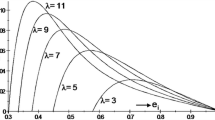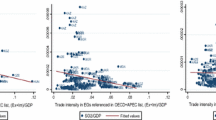Abstract
During the Doha Round at the World Trade Organization, reductions in trade barriers on environmental goods (EG) were put forward as a means of helping developed and developing countries alike deal with current environmental problems. We examine the potential effectiveness of such a strategy in a developing country that imports all its consumption of EG from an imperfectly competitive foreign eco-industry. We point out that trade liberalization of EG might in fact lead to less stringent pollution taxes, which can result in an actual rise in pollution levels. We then show that the environmental effectiveness objective of this trade reform can be achieved when the regulator uses quantitative abatement standards as an alternative pollution policy instrument. However, this environmental achievement comes at the expense of social welfare.
Similar content being viewed by others
Abbreviations
- EG:
-
Environmental goods
- OECD:
-
Organization for Economic Cooperation and Development
- R&D:
-
Research and Development
- UNCTAD:
-
United Nations Conference on Trade and Development
- USITC:
-
United States International Trade Commission
- WTO:
-
World Trade Organization
References
Baksi S, Ray chaudhuri A (2009) On trade liberalization and transboundary pollution. Econ Bull 29(4): 2605–2612
Barrett S (1994) Strategic environmental policy and international trade. J Public Econ 54: 325–338
Baumol WJ (1995) Environmental industries with substantial start-up costs as contributors to trade competitiveness. Annu Rev Energy Environ 20: 71–81
Bergstrom TC (1982) On capturing oil rents with a national excise tax. Am Econ Rev 72: 194–201
Biglaiser G, Horowitz JK, Quiggin J (1995) Dynamic pollution regulation. J Regul Econ 8: 33–44
Bora B, Teh R (2004) Trade and tariffs on environmental goods. Paper presented at the workshop on environmental goods. WTO Secretariat, Geneva, 11 October 2004
Brander JA, Spencer BJ (1981) Tariffs and the extraction of foreign monopoly rents under potential entry. Can J Econ 14: 371–389
Brander JA, Spencer BJ (1984a) Trade warfare: tariffs and cartels. J Int Econ 16: 227–242
Brander JA, Spencer BJ (1984b) Tariff protection and imperfect competition. In: Kierzkowski H (ed) Monopolistic competition and product differentiation in international trade. Oxford University Press, Oxford
Brock A, Boadu FO (2004) Global demand for U.S. environmental goods and services. J Agric Appl Econ 36: 49–64
Burguet R, Sempere J (2003) Trade liberalization, environmental policy, and welfare. J Environ Econ Manag 46: 25–37
Canton J (2007) Environmental taxation and international eco-industries. Nota de lavoro 26-2007, FEEM
Canton J, Soubeyran A, Stahn H (2008) Environmental taxation and vertical cournot oligopolies: how eco-industries matter. Environ Resour Econ 40(3): 369–382
Carpentier CL, Gallagher KP, Vaughan S (2005) Environmental goods and services in the world trade organization. J Environ Dev 14(2): 225–251
Conrad K (1993) Taxes and subsidies for pollution-intensive industries as trade policy. J Environ Econ Manag 25: 121–135
Copeland B (2000) Trade and environment: policy linkages. Environ Dev Econ 5: 405–432
Copeland B (2005) Pollution policy and the market for abatement services. Paper presented at the EAERE 14th annual conference. Bremen, Germany, 23–25 June 2005
David M, Sinclair-Desgagné B (2005) Environmental regulation and the eco-industry. J Regul Econ 28(2): 141–155
David M, Sinclair-Desgagné B (2010) Pollution abatement subsidies and the eco-industry. Environ Resour Econ 45(2): 271–282
David M, Nimubona A-D, Sinclair-Desgagné B (2011) Emission taxes and the market for abatement goods and services. Resour Energy Econ 33(1): 179–191
Dijkstra BR, Mathew AJ (2010) Liberalizing trade in environmental goods. GEP working paper 10/05, University of Nottingham
Dixit AK (1984) International trade policies for oligopolistic industries. Econ J 94(Supplement): 1–16
Feess E, Muehlheusser G (1999) Strategic environmental policy, international trade, and the learning curve: the significance of the environmental industry. Rev Econ 50(2): 178–194
Feess E, Muehlheusser G (2002) Strategic environmental policy, clean technologies and the learning curve. Environ Resour Econ 23: 66–149
Fujiwara K (2010) Strategic environmental policies and the gains from trade liberalization. Rev Devel Econ 14(2): 360–373
Geloso Grosso M (2003) Managing request-offer negotiations under the GATS: the case of environmental services. Trade policy working paper no 2003-01, organization for economic cooperation and development
Greaker M (2006) Spillovers in the development of new pollution abatement technology: a new look at the Porter-hypothesis. J Environ Econ Manag 52(1): 411–420
Greaker M, Rosendahl E (2008) Environmental policy with upstream pollution abatement technology firms. J Environ Econ Manag 56: 246–259
Hamilton SF, Requate T (2004) Vertical structure and strategic environmental trade policy. J Environ Econ Manag 47: 260–269
Heyes A, Kapur S (2011) Regulatory attitudes and environmental innovation in a model combining internal and external R&D. J Environ Econ Manag 61: 327–340
Hillman AL, Templeman J (1985) On the use of trade policy measures by a small country to counter foreign monopoly power. Oxf Econ Papers 37(2): 346–352
Jha V (2008) Environmental priorities and trade policies for environmental goods: a reality check. Trade and environment series issue paper no 7, international centre for trade and sustainable development
Katrak H (1977) Multinational monopolies and commercial policy. Oxf Econ Papers 29: 282–291
Kennedy PW (1994) Equilibrium pollution taxes in open economies with imperfect competition. J Environ Econ Manag 27(1): 49–63
Kennett M, Steenblik R (2005) Environmental goods and services: a synthesis of country studies. Trade and environment working paper no 2005-03, organization for economic cooperation and development
Lai Y-B (2006) Interest groups, trade liberalization, and environmental standards. Environ Resour Econ 34: 269–290
Lai Y-B (2007) The political economy linkage between trade Liberalization and domestic environmental regulations. Public Choice 133: 57–72
Long NV, Soubeyran A (2000) Pollution, pigouvian taxes, and asymmetric international oligopoly. In: Petrakis E, Sartzetakis E, Xepapadeas A (eds) Environmental regulation and market structure. Edward Elgard, London
Long NV, Soubeyran A (2005) Selective penalization of polluters: an inf-convolution approach. Econ Theory 25(2): 421–454
Markusen JR (1975) International externalities and optimal tax structures. J Int Econ 5(1): 15–29
Nimubona A-D, Sinclair-Desgagné B (2005) The pigouvian tax rule in the presence of an eco-industry. CIRANO working paper no 57.05
Nimubona A-D, Sinclair-Desgagné B (2011) Polluters and abaters. Ann Econ Stat 103–104:9–24
Nkuiya Mbakop RB (2011) Essais sur des questions Internationales en Économie de l’Environnement. Doctoral Dissertation, Université de Montréal, March 2011
Organization for Economic Cooperation and Development (2001) Environmental goods and services: the benefits of further global trade liberalization. Paris
Organization for Economic Cooperation and Development (2005) Policy brief: opening markets for environmental goods and services. Paris
Organization for Economic Cooperation and Development and Eurostat (1999) The global environmental goods and services industry: manual for data collection and analysis. OECD Editions, Paris
Rauscher M (1994) On ecological dumping. Oxf Econ Papers 46: 822–840
Rauscher M (1997) Imperfect competition, foreign trade, and the environment. In: Rauscher M (ed) International trade, factor movements, and the environment. Clarendon Press, Oxford
Requate T (2005) Timing and commitment of environmental policy, adoption of new technology, and repercussions on R&D. Environ Resour Econ 31: 175–199
Simpson R (2006) Environmental services and competition: a global perspective. Rev Eur Community Int Environ Law 15(2): 160–171
Sinclair-Desgagné B (2008) The environmental goods and services industry. Int Rev Environ Resour Econ 2: 69–99
Steenblik R, Drouet D, Stubbs G (2005) Synergies between trade in environmental services and trade in environmental goods. Trade and environment working paper no 2005-01, organization for economic cooperation and development
Straume OR (2006) Product market integration and environmental policy coordination in an international duopoly. Environ Resour Econ 34: 535–563
Svedberg P (1979) Optimal tariff policy on imports from multinationals. Econ Record 55: 64–67
Tower E (1983) On the best use of trade controls in the presence of foreign market power. J Int Econ 15: 349–365
Ulph A (1997) International trade and the environment: a survey of recent economic analysis. In: Folmer H, Tietenberg T (eds) The international yearbook of environmental and resource economics. Edward Elgar, Cheltenham
United Nations Conference on Trade and Development (2003) Environmental goods: trade statistics of developing countries. TD/B/COM.1/EM.21/CRP.1, Geneva
United States International Trade Commission (2004) Remediation and nature and landscape protection services: an examination of U.S. and foreign markets, USITC Publication no 3727, Washington, DC
Walz U, Wellisch D (1997) Is free trade in the interest of exporting countries when there is ecological dumping?. J Public Econ 66: 275–291
World Bank (2007) International trade and limate change: economic, legal, and institutional perspectives. World Bank Publications, Washington, D.C
World Trade Organization (2001) Doha declarations. Geneva
Author information
Authors and Affiliations
Corresponding author
Additional information
Author is grateful to Hassan Benchekroun, Anthony Heyes, Bernard Sinclair-Desgagné, and two anonymous referees for their very helpful comments and suggestions, which have significantly improved this paper. He also thanks Joan Canton, Chantal Line Carpentier, Maia David, Adeyemi Esuola, Ruth Forsdyke, Margaret Insley, Sylvain Leduc, Fabrice Ndikumagenge, and participants at numerous conferences and workshops for valuable comments on previous versions of the paper. The usual disclaimer applies.
Electronic Supplementary Material
The Below is the Electronic Supplementary Material.
Rights and permissions
About this article
Cite this article
Nimubona, AD. Pollution Policy and Trade Liberalization of Environmental Goods. Environ Resource Econ 53, 323–346 (2012). https://doi.org/10.1007/s10640-012-9564-4
Accepted:
Published:
Issue Date:
DOI: https://doi.org/10.1007/s10640-012-9564-4




